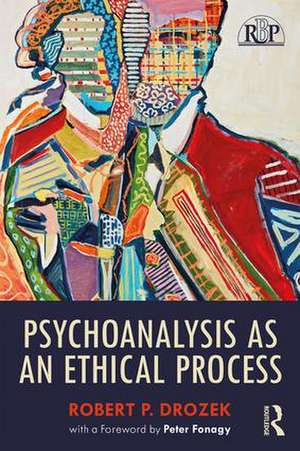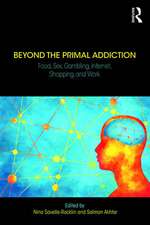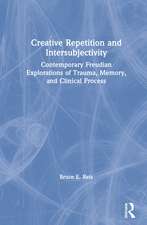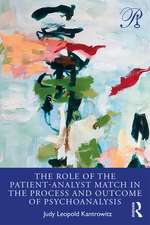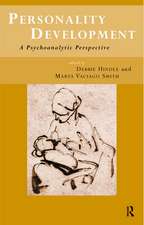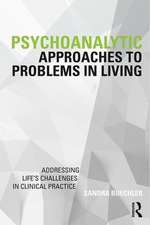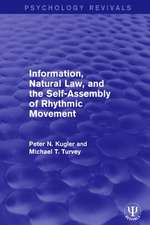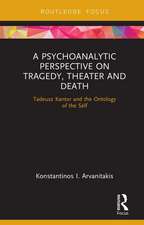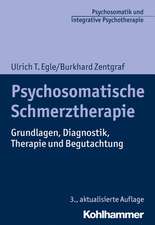Psychoanalysis as an Ethical Process: Relational Perspectives Book Series
Autor Robert P. Drozeken Limba Engleză Paperback – 20 feb 2019
Formostofitshistory,psychoanalysishasviewedethicsasa"sideissue"inclinicalwork--occasionallyimportant,butnotcentraltotherapeuticaction.InPsychoanalysisasanEthicalProcess,RobertDrozekhighlightsthefoundationalimportanceofethicalexperienceinthetherapeuticrelationship,aswellastherolethatethicalcommitmentshaveplayedininspiringwhathasbeencalledthe"relationalturn"inpsychoanalysis.
Usingvividclinicalexamplesfromthetreatmentofpatientswithseverepersonalitydisorders,Drozeksketchesoutanethically-groundedvisionofanalyticprocess,whereinanalystandpatientareengagedintheco-constructionofanintersubjectivespacethatisprogressivelymoreconsistentwiththeirintrinsicworthashumanbeings.Psychoanalysiscanthusbeseenasauniquevehiclefortherapeuticandethicalchange,leadingtoadramaticexpansionofagency,altruism,andself-esteemforbothparticipants.Bybringingouranalytictheoriesintoclosercontactwithourethicalexperiencesashumanbeings,wecanconnectmorefullywiththefundamentalhumanitythatunitesuswithourpatients,andthatservesasthebasisfordeepandlastingtherapeuticchange.
Thisbookwillbeofinteresttopsychotherapistsandpsychoanalysts,aswellasscholarsinethicaltheoryandphilosophy.
| Toate formatele și edițiile | Preț | Express |
|---|---|---|
| Paperback (1) | 319.74 lei 6-8 săpt. | |
| Taylor & Francis – 20 feb 2019 | 319.74 lei 6-8 săpt. | |
| Hardback (1) | 974.14 lei 6-8 săpt. | |
| Taylor & Francis – 21 feb 2019 | 974.14 lei 6-8 săpt. |
Din seria Relational Perspectives Book Series
- 5%
 Preț: 288.36 lei
Preț: 288.36 lei - 5%
 Preț: 227.31 lei
Preț: 227.31 lei - 5%
 Preț: 248.39 lei
Preț: 248.39 lei - 5%
 Preț: 316.44 lei
Preț: 316.44 lei - 5%
 Preț: 309.04 lei
Preț: 309.04 lei -
 Preț: 266.64 lei
Preț: 266.64 lei -
 Preț: 229.70 lei
Preț: 229.70 lei - 5%
 Preț: 231.83 lei
Preț: 231.83 lei - 5%
 Preț: 267.45 lei
Preț: 267.45 lei - 5%
 Preț: 301.77 lei
Preț: 301.77 lei - 5%
 Preț: 273.23 lei
Preț: 273.23 lei - 5%
 Preț: 331.65 lei
Preț: 331.65 lei - 5%
 Preț: 189.76 lei
Preț: 189.76 lei -
 Preț: 273.84 lei
Preț: 273.84 lei - 5%
 Preț: 289.39 lei
Preț: 289.39 lei - 5%
 Preț: 231.83 lei
Preț: 231.83 lei - 5%
 Preț: 940.25 lei
Preț: 940.25 lei - 5%
 Preț: 232.77 lei
Preț: 232.77 lei - 5%
 Preț: 275.63 lei
Preț: 275.63 lei -
 Preț: 213.39 lei
Preț: 213.39 lei - 5%
 Preț: 274.21 lei
Preț: 274.21 lei - 5%
 Preț: 233.27 lei
Preț: 233.27 lei - 5%
 Preț: 315.51 lei
Preț: 315.51 lei - 5%
 Preț: 287.16 lei
Preț: 287.16 lei - 5%
 Preț: 219.18 lei
Preț: 219.18 lei -
 Preț: 371.53 lei
Preț: 371.53 lei - 5%
 Preț: 253.45 lei
Preț: 253.45 lei - 5%
 Preț: 183.34 lei
Preț: 183.34 lei - 5%
 Preț: 318.23 lei
Preț: 318.23 lei - 5%
 Preț: 266.90 lei
Preț: 266.90 lei - 5%
 Preț: 274.82 lei
Preț: 274.82 lei - 5%
 Preț: 346.04 lei
Preț: 346.04 lei - 5%
 Preț: 219.50 lei
Preț: 219.50 lei - 5%
 Preț: 231.91 lei
Preț: 231.91 lei - 5%
 Preț: 324.12 lei
Preț: 324.12 lei - 5%
 Preț: 401.89 lei
Preț: 401.89 lei - 5%
 Preț: 332.28 lei
Preț: 332.28 lei - 5%
 Preț: 534.99 lei
Preț: 534.99 lei - 5%
 Preț: 323.32 lei
Preț: 323.32 lei -
 Preț: 336.72 lei
Preț: 336.72 lei - 5%
 Preț: 416.67 lei
Preț: 416.67 lei - 5%
 Preț: 425.09 lei
Preț: 425.09 lei - 5%
 Preț: 456.44 lei
Preț: 456.44 lei - 5%
 Preț: 464.96 lei
Preț: 464.96 lei - 5%
 Preț: 382.83 lei
Preț: 382.83 lei
Preț: 319.74 lei
Preț vechi: 336.57 lei
-5% Nou
61.19€ • 66.44$ • 51.40£
Carte tipărită la comandă
Livrare economică 22 aprilie-06 mai
Specificații
ISBN-10: 1138064459
Pagini: 304
Dimensiuni: 156 x 234 x 16 mm
Greutate: 0.46 kg
Ediția:1
Editura: Taylor & Francis
Colecția Routledge
Seria Relational Perspectives Book Series
Locul publicării:Oxford, United Kingdom
Public țintă
Postgraduate, Professional, and Professional Practice & DevelopmentCuprins
PART I: Psychoanalysis and ethics
1 Introduction to an ethical psychoanalysis
2 A dialectical vision of psychoanalytic ethics
PART II: Theoretical revisions
3 The dilemma of intersubjective motivation
4 The dignity in multiplicity
5 Value as the native tongue of psychoanalysis
PART III: Clinical applications
6 Psychoanalysis as an ethical process
7 The ethical dialectics of technique
8 Conclusion: The dialectical method of psychoanalysis
Notă biografică
Recenzii
"Robert Drozek, in this splendid new book, argues that psychoanalysis is at heart an ethical process. He persuasively convinces the reader that therapeutic change has an ethical component to it of which we may or may not be aware. He touches on the role of dignity for both members of the dyad, value as the native tongue of psychoanalysis, and the sources of motivation for change. Throughout the book he provides detailed clinical material that helps the reader grasp how he translates his thinking into what one does in the give-and-take of the analytic setting. I highly recommend this superb new book to both analysts and analytic therapists."-Glen O. Gabbard, MD, author of Boundaries and Boundary Violations in Psychoanalysis
"Psychoanalysis as an Ethical Process is an inspiring and important reconsideration of relational psychoanalytic theory, which shines light into the crucial motivation of intersubjectivity. It highlights the need to ground our clinical work in the conscious reflection on the unconditional value of the other, that is dignity, and this in turn becomes the basis for radical transformation of our self- and other-awareness. Drozek provides an exceptionally lucid narrative, replete with clinical examples, about the way in which ethical thinking is integral to psychoanalysis both as theory and practice. In so doing, he makes tangible for us the unity of these elements, and removes many obstacles to making theory an exciting and uplifting part of our process."-Jessica Benjamin, PhD, Faculty, New York University Postdoctoral Psychology Program and the Stephen Mitchell Relational Studies Center, New York; author of Beyond Doer and Done To
Descriere
What role does ethics play in the practice of psychoanalysis and psychotherapy?For most of its history, psychoanalysis has viewed ethics as a "side issue" in clinical work-occasionally relevant, but not central to therapeutic action. In Psychoanalysis as an Ethical Process, Robert Drozek highlights the foundational importance of ethical experience in the therapeutic relationship, as well as the role that ethical commitments have played in inspiring what has been called the "relational turn" in psychoanalysis. Using vivid clinical examples from the treatment of patients with severe personality disorders, Drozek sketches out an ethically grounded vision of analytic process, wherein analyst and patient are engaged in the co-construction of an intersubjective space that is progressively more consistent with their intrinsic worth as human beings.
Psychoanalysis can thus be seen as a unique vehicle for therapeutic and ethical change, leading to a dramatic expansion of agency, altruism, and self-esteem for both participants. By bringing our analytic theories into closer contact with our ethical experiences as human beings, we can connect more fully with the fundamental humanity that unites us with our patients, and that serves as the basis for deep and lasting therapeutic change. This book will be of interest to psychotherapists and psychoanalysts, as well as scholars in ethical theory and philosophy.
